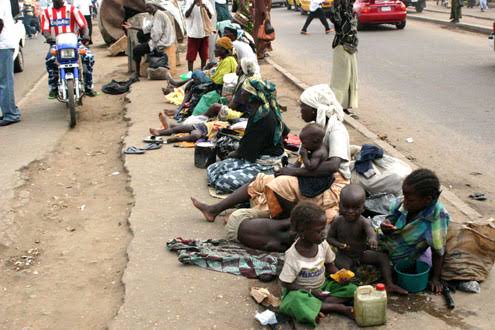What a Pity! Poverty in the Land
.jpg)
POVERTY IN NIGERIA
Nigeria has one of the world's highest economic growth rates, averaging 7.4% according to the Nigeria economic report released in July 2014 by the World Bank. Poverty still remains significant at 33.1% in Africa's GBeconoeconomic economicmy. For a country with massive wealth and a huge population to supporting my commerce, a well-developed economy, and plenty of natural resources such as oil, the level of poverty remains unacceptable.
However, poverty may have been overestimated due to the lack of information on the extremely huge informal sector of the economy,estimated at around 60% more, of the current GDP figures.
Poverty in Nigeria can also be caused by the political instability of the country. However, these programs have largely failed to overcome the three reasons for this persistent poverty: income inequality, ethnic conflict, and political instability.
Nigeria has one of the world's highest economic growth rates, averaging 7.4% according to the Nigeria economic report released in July 2014 by the World Bank. Poverty still remains significant at 33.1% in Africa's biggest economy. For a country with massive wealth and a huge population to support commerce, a well-developed economy, and plenty of natural resources such as oil, the level of poverty remains unacceptable. However, poverty may have been overestimated due to the lack of information on the extremely huge informal sector of the economy estimated at around 60% more, of the current GDP figures.
.jpg)
Poverty in Nigeria can also be caused by the apolitical instability of the country. However, these programs have largely failed to overcome the three reasons for this persistent poverty: income inequality, ethnic conflict, and political instability.
Nigeria has historically experienced much ethnic conflict. With the return to civilian rule in 1999, militants from religious and ethnic groups have become markedly more violent. While this unrest has its roots in poverty and economic competition, its economic and human damages further escalate the problems of poverty (such as increasing the mortality rate). For instance, ethnic unrest and the displeasure to local communities with oil companies has contributed to the over oil trade in the Niger Delta, which threatens the productive programme made. Civil unrest might also have contributed to the adoption of populist policy measures which work in the short-run, but impede poverty alleviation efforts.
POLITICAL INSTABILITY AND CORRUPTION
Nigeria's large population and historic ethnic instability has led to the adoption of a federal government. The resultant fiscal decentralisation provides Nigeria’s state and local governments considerable autonomy, including control over 50% of government revenues, as well as responsibility for providing public services.
The lack of a stringent regulatory and monitoring system has allowed for rampant corruption. This has hindered past poverty alleviation efforts to a large extent since resources which could pay for public goods or directed towards investment (and so create employment and other opportunities for citizens) are being misappropriate
.jpg)
GOVERNMENT PROGRAMMES
There have been attempts at poverty alleviation, most notably with the following programmes.
1972: National Accelerated Food Production Programme and the Nigerian Agricultural and Co-operative Bank.
1976: Operation Feed the Nation: to teach the rural farmers how to use modern farming tools.
1979: Green Revolution Programme: to reduce food importation and increase local food production.
1986: Directorate of Food, Roads and Rural Infrastructure (DFRRI)
1993: Family Support Programme and the Family Economic Advancement Programme 2001: National Poverty Eradication Programme (NAPEP): to replace the previously failed Poverty Alleviation Program.
Thanks for reading
Source: Pedia